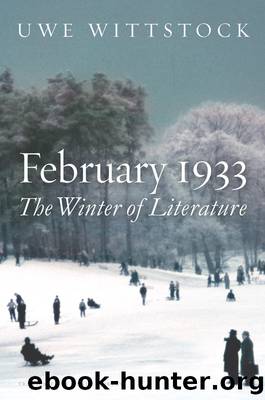February 1933 by Uwe Wittstock

Author:Uwe Wittstock [Wittstock, Uwe]
Language: eng
Format: epub
Published: 2023-01-20T00:00:00+00:00
Figure 16: Gottfried Benn in 1934
When he was so low on money several years ago that he was unable to pay his taxes on time, the tax office swiftly threatened him with seizure of property, and he was beside himself with rage at this humiliation. This washed-up and worn-out state, he raved then, needs to be smashed to pieces.
The Academy is all the more important to Benn. A year ago Oskar Loerke called him up one evening unexpectedly and informed him the literature division had elected him its newest member. âPlease donât joke around with this old man,â he replied. He was tremendously happy. Now, finally, he was getting the official recognition he sorely lacked. Finally, he was being accorded his place among the nationâs literary elite. No longer was he a poor doctor to prostitutes who hardly earned more than a handful of good reviews for his poems. Now he was taking his seat at the round table of the most prominent German-language authors of the age.
Internally, his appointment to the Academy was no simple matter. Thomas and Heinrich Mann made the case for Bennâs induction because in him they saw a wordsmith of the highest order, but also an intellectual who views history and culture from a brutally cold-hearted, almost scientific perspective. That jibed well with the smart objectivity that had characterized the fashion of the time for several years. Oskar Loerke, a friend of Bennâs, advocated for him, too. But Ricarda Huch, the deputy chairperson of the division after all, viewed Bennâs emphatically nihilistic tone as cheap posturing and not as the result of a lifestyle disenchanted to the core: âI find Gottfried Benn outrageous. There are many disgusting aspects to life, but one is not a poet because one strings together one repugnance after the other; it is also true that our language is shopworn, but one does not overcome this barrier by using nothing but unusual, esoteric, showy words.â
A measure of the Academyâs importance for Benn can be gleaned from the fact that he almost never misses a meeting. Today President Schillings has come to the writersâ division because, as he makes plain right away, he wants to prevent any public protest in the Heinrich Mann affair. The situation, he says, continues to be difficult, and he explicitly asks the writers, in the interest of the future of the Academy, to come to a conciliatory agreement.
At once Döblin butts in and flusters the president with a simple question Schillings by rights had to see coming. Why does he consider the situation still to be difficult?
Schillingsâ answer comes off, as it so often has, as vague. He likes to play it close to the vest. The difficulties, he says, are expressed in the numerous newspaper opinion articles.
That is odd reasoning, plucked out of the air, because of course everyone present knows that it is not the newspapers that decide on the Academyâs continued existence, but the new government. As Schillings must admit, however, the latter has not been in touch again after Käthe Kollwitz and Heinrich Mann took their leave on Wednesday.
Download
This site does not store any files on its server. We only index and link to content provided by other sites. Please contact the content providers to delete copyright contents if any and email us, we'll remove relevant links or contents immediately.
| France | Germany |
| Great Britain | Greece |
| Italy | Rome |
| Russia | Spain & Portugal |
Fanny Burney by Claire Harman(25792)
Empire of the Sikhs by Patwant Singh(22185)
Out of India by Michael Foss(16315)
Leonardo da Vinci by Walter Isaacson(11919)
Small Great Things by Jodi Picoult(6108)
The Six Wives Of Henry VIII (WOMEN IN HISTORY) by Fraser Antonia(4799)
The Wind in My Hair by Masih Alinejad(4427)
The Lonely City by Olivia Laing(4127)
The Crown by Robert Lacey(4115)
A Higher Loyalty: Truth, Lies, and Leadership by James Comey(4041)
The Iron Duke by The Iron Duke(3650)
Millionaire: The Philanderer, Gambler, and Duelist Who Invented Modern Finance by Janet Gleeson(3576)
Sticky Fingers by Joe Hagan(3456)
Alive: The Story of the Andes Survivors by Piers Paul Read(3320)
Papillon (English) by Henri Charrière(3280)
Joan of Arc by Mary Gordon(3270)
Stalin by Stephen Kotkin(3091)
Aleister Crowley: The Biography by Tobias Churton(3026)
Ants Among Elephants by Sujatha Gidla(2928)
